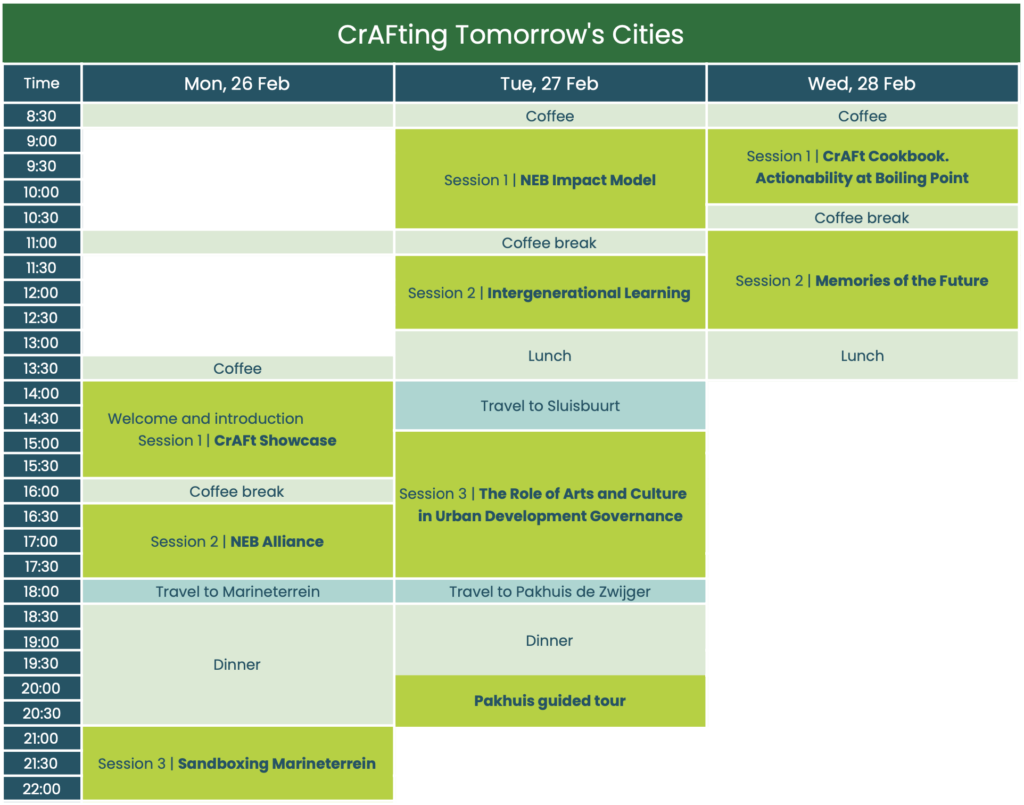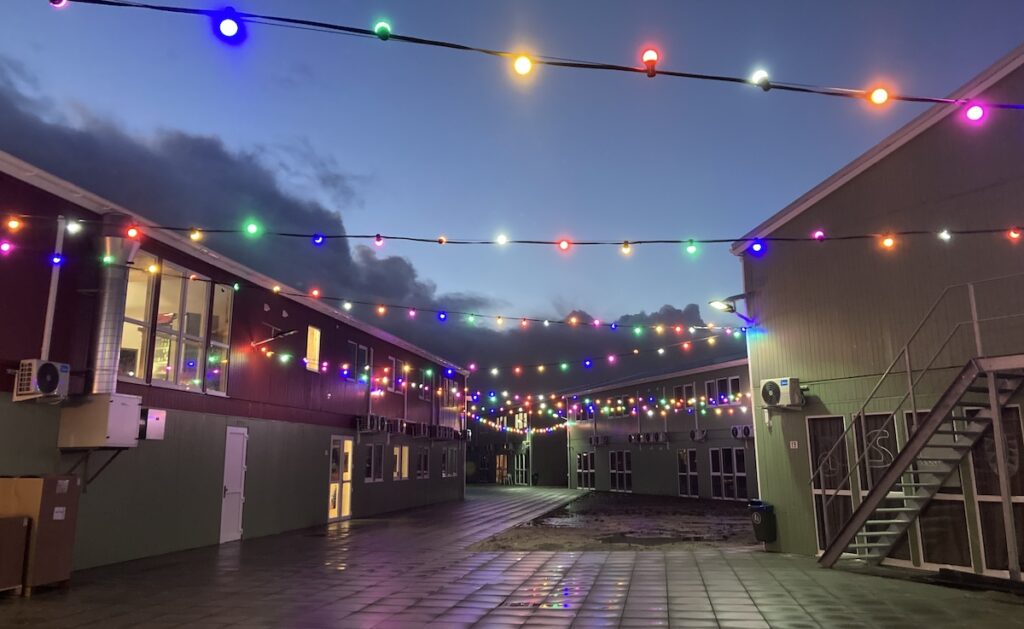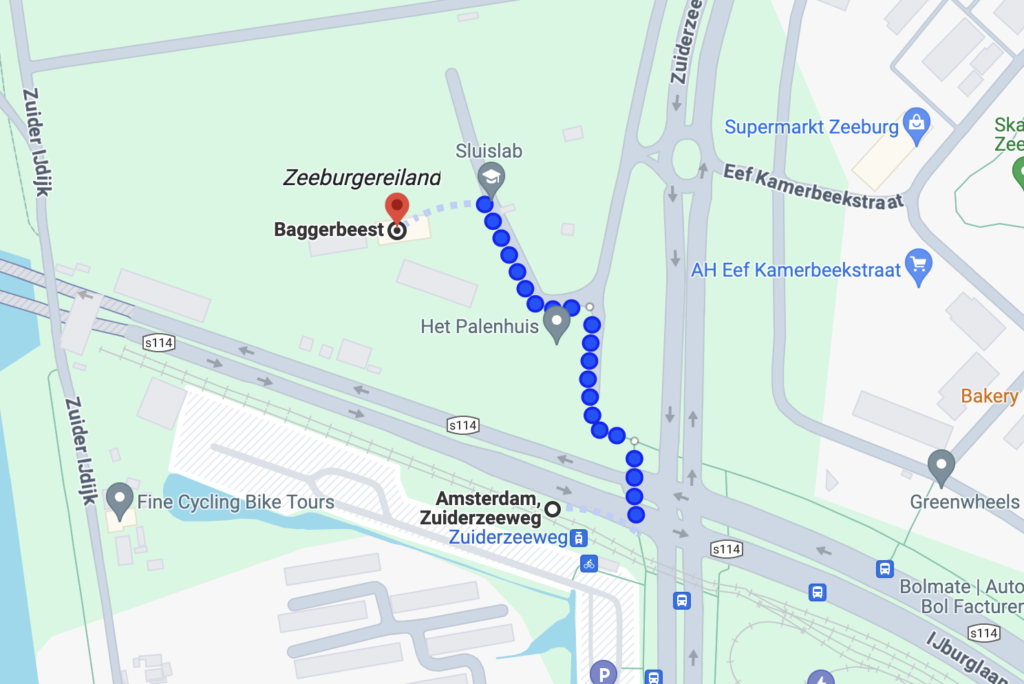NEB ambition
The ultimate ambition of the New European Bauhaus is to achieve transformation. To do this, the NEB Compass has identified specific levels of ambition that outline the desired outcomes for each of the NEB values.
The ultimate ambition of the New European Bauhaus is to achieve transformation. To do this, the NEB Compass has identified specific levels of ambition that outline the desired outcomes for each of the NEB values.
These areas refer to the five key domains of intervention that CrAFt's New European Bauhaus Impact Model considers essential for guiding and evaluating complex urban initiatives.
The participation level refers to the degree or extent to which individuals or groups are actively involved or engaged in a particular activity, project, or process. It assesses the depth of their involvement, contributions, and commitment, ranging from minimal or passive participation to active and dedicated participation.
The New European Bauhaus (NEB) aims to promote the values of sustainability, aesthetics, and inclusion in the design and transformation of urban spaces. It emphasises the integration of environmental, social, and economic considerations to create harmonious and innovative living environments.
According to the Smart City Guidance Package, there are seven stages to plan and implement smart city projects. These stages propose a logical and coherent roadmap for city initiatives involving many stakeholders.
The event CrAFting Tomorrow’s Cities represents a pivotal gathering for the CrAFt urban movement and our collective journey towards a more sustainable future for our cities and communities.
Started in 2022, Creating Actionable Futures (CrAFt) is funded by the Horizon Europe programme of the European Commission within the Cities Mission work programme. Inspired by the New European Bauhaus initiative, CrAFt uses the power of local collaborative methods to forge new pathways towards climate neutrality.
By joining our event in Amsterdam, Netherlands, from 26 to 28 February 2024, you will have the opportunity to:

Session 1 – CrAFt Showcase: CrAFting Tomorrow’s Cities will kick off by inviting attendees to delve into the magic of participation and storytelling, immersing themselves in the essence of CrAFt.
Session 2 – NEB Alliance: In this session, we will formally introduce the NEB Alliance Manifesto, enriched by testimonials by CrAFt Cities and NEB Alliance partners. The session will be supported by a co-created exhibition of a positive, actionable future.
Session 3 – Sandboxing Marineterrein: The CrAFt team will guide night owls through a captivating moonlit night walk, providing an intimate exploration of the pilot project at Marineterrein. Join us for an unforgettable session that blends innovation and immersive experiences. Participants are advised to bring earplugs and ensure their phone is fully charged, along with wearing comfortable shoes and warm clothing.
Session 1 – NEB Impact Model: This session will present a gamified approach to unleash creativity and foster collaboration. Together, we will navigate the dynamic landscape of transformation areas, creating exciting co-benefits and skillfully mitigating potential conflicts among stakeholders.
Session 2 – Intergenerational Learning: CrAFt students will guide us through envisioning, fostering intergenerational learning, and celebrating the power of student voices. This collaborative experience will focus on kickstarting replicability processes, exploring innovative formats with partners in a consortium, and cultivating a shared vision for transformative education.
Session 3 – The Role of Arts and Culture in Urban Development Governance: Participants will be invited to engage in a series of excursions in one of CrAFt’s pilot projects in Amsterdam: Sluisbuurt. They will witness firsthand how these arts and culture contribute to collaboration and forge a collective identity in a new neighbourhood. Participants will have the opportunity to choose one of the following options (max 20 people per option):
The session on The New European Bauhaus and Urban Developers has been canceled. Instead, we will enjoy a guided tour of Pakhuis and get some free time to explore and experience the place. Check their activities programme.

Session 1 – CrAFt Cookbook. Actionability at Boiling Point: Every city is different, and every community is diverse. CrAFt’s Cookbook offers easy and adjustable recipes for integrating the values of inclusiveness, beauty and sustainability in urban plans and partnerships, with a strong focus on actionability. This session updates you on the first official version. It delves into how your experiences and insights can contribute to the book’s second edition.
Session 2 – Memories of the Future: Step into the heartbeat of the city with us! Explore your individual needs and the city’s response in a unique blend of mental mapping and immersive body experiences. Join the culmination of CrAFting Tomorrow’s Cities, where we transform imagination into direct motivation and spark the necessary actions for a sustainable urban future.
This event is free of charge and it includes the following meals: dinner on Monday, lunch and dinner on Tuesday, and lunch on Wednesday, as well as coffee breaks throughout the event. CrAFt Cities’ participation is not mandatory but recommended as the programme includes time for the exchange of experiences between them and other project partners.
We have reached the maximum number of participants for the event and the registration closed.
Should you have any questions regarding the event, contact us at contact@craft-cities.eu
Event location
Amsterdam University of Applied Sciences (AUAS)
Muller-Lulofs Building (MLH) — Room MLH01A
Wibautstraat 5a
1091 GH Amsterdam
Netherlands
Check the map
Travel directions by public transport
The location is very conveniently located opposite metro stop Weesperplein (see Amsterdam metro map).
Details for planning of travel by local public transport can be found in 9292.nl (app and website). This app and website give advice on public transport and also sells tickets online, in Dutch and English.
For trains you can also check 9292.nl (in Dutch) or ns.nl (in English).
How to get your transport tickets
Paying for a tram or bus ride with GVB can be easily done through OVpay. The only thing you need is your bank card to check in and check out. Check-in when you enter the tram or bus, and check out when you arrive at your terminus. Pre-registration or downloading a separate app is not necessary.
Marineterrein – Monday, 26 February, 18:00-21:00
Address: Marine Etablissement Amsterdam
, Kattenburgerstraat 5,
1018 JZ Amsterdam
From Central Station: From Central Station you can walk directly to Marineterrein and it will take you around 20 minutes. Or take tram 26towards IJburg and get out at the Muziekgebouw. Follow the stairs down and then turn left, walk down the Dijksgracht and turn right to cross the bridge towards the Marineterrein.
From Hva MHL: From our location at HvA, you can take tram 3 direction Flevopark from Wibaurstraat or tram 7 direction Azartpleinfrom Weesperplein (both 3/5 minutes walking distance from MHL). If you take tram 3 you need to step out at Muiderpoort Station, walk 1 minute and take bus 22 towards Station Sloterdijk. If you take tram 7 you take the same bus 22 but from Oostenburgergracht. Both options will take you right in front of the main entrance by stepping out at Kattenburgerstraat.
The buildings at the Marineterrein are numbered. There are no street names. So, it is important to know which building number you need before arrival. Homeland is number 006. COWO is number 001. Check the interactive map.
Contact details: In case you need help, please reach out to Federica Colombo (+31 6 50452150) or Rubens Logjes (+31 6 21155979).
Sluisbuurt (Baggerbeest) – Wednesday, 28 February, 15:00 – 17:00
Address: Rudi van Dantzigstraat 1 t, m 15, 1095 PK Amsterdam
Traveling to Sluisbuurt from the AUAS campus at Wibautstraat to the breeding place Baggerbeest can be accomplished through various options. This is the option with the minimum walking distance: From Weesperplein (near AUAS Campus), tram 7 can take you to Rietlandpark (direction Azartplein). Here, you need to transfer and take tram 26 (direction Ijburg) to Zuiderzeeweg. Note that this is only one stop. From the tram stop Zuiderzeeweg, it’s only a 5-minute walk towards Baggerbeest. Please refer to the image below for further walking directions.

Photo by Pixabay